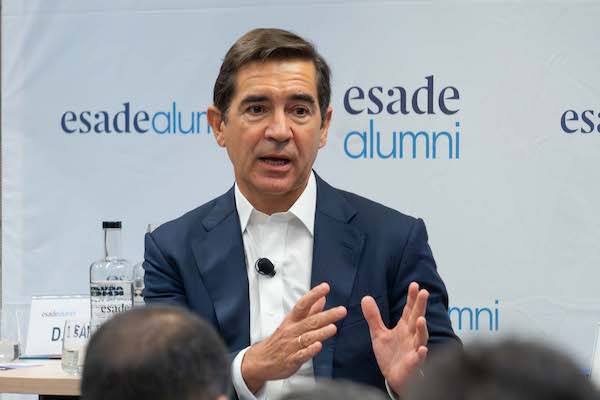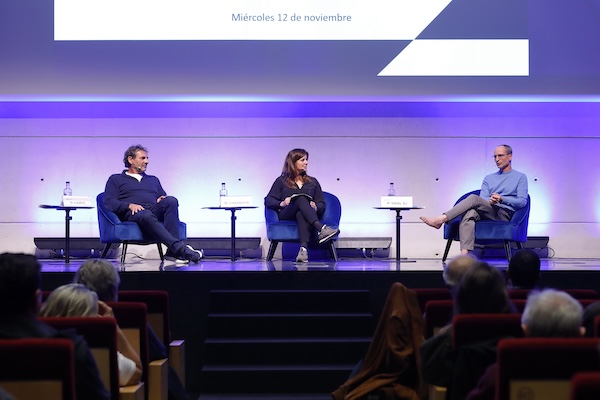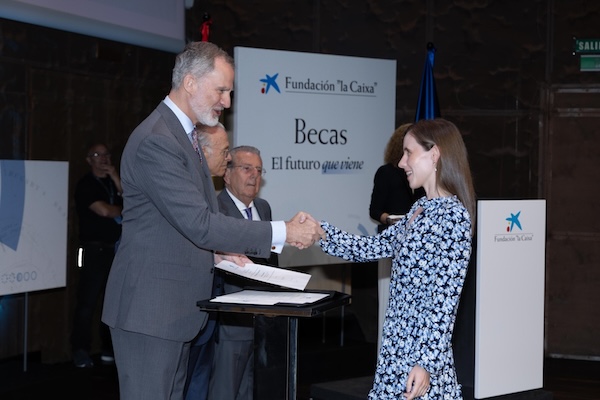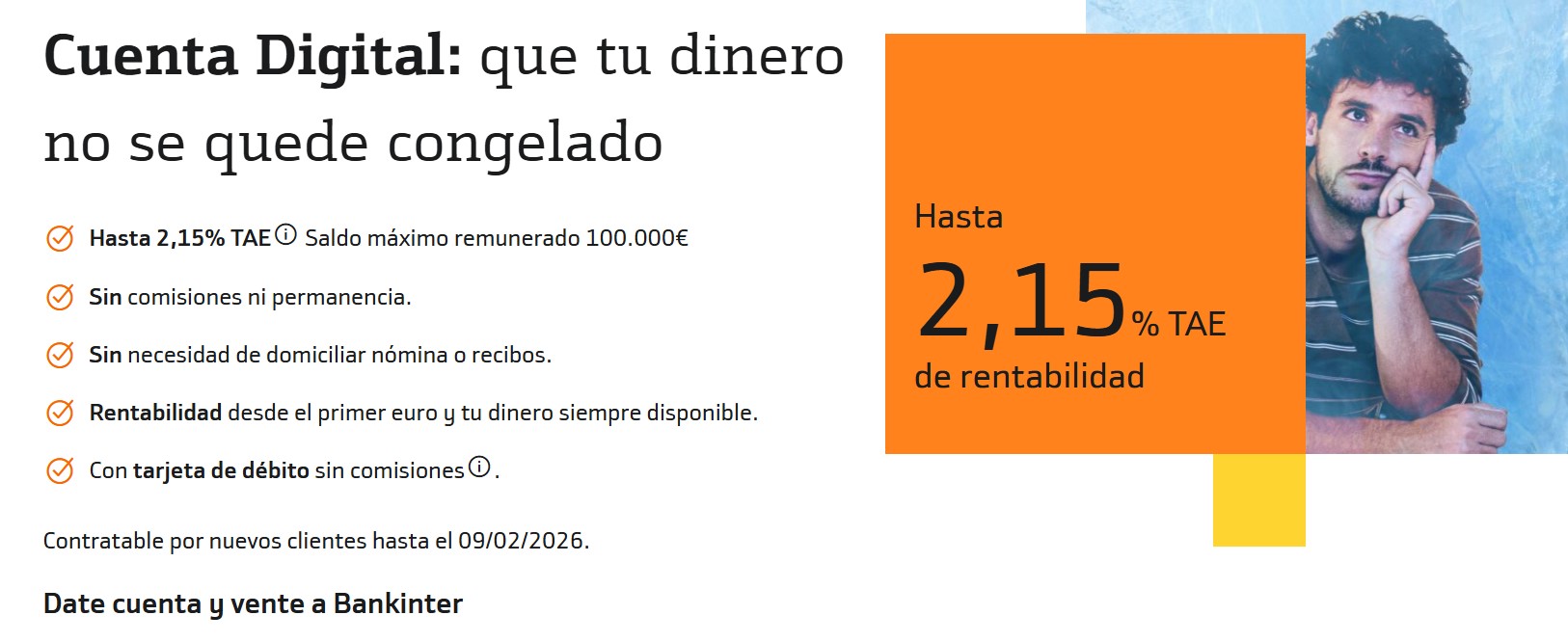At the latest Esade Matins session, BBVA president Carlos Torres Vila underlined the great “future appeal” of Catalonia and his bank’s desire to help the region grow.

In a meeting that aroused great interest among alumni, Torres Vila emphasized how important this region is to BBVA, being the region that contributes most to their business in Spain plus the fact that one in four new SME customers are from Catalonia. In this respect, the merger with Banc Sabadell would bolster BBVA’s commitment to Catalonia and SMEs: “We want to continue growing along with Catalonia, and the merger with Banc Sabadell reflects this”. As regards banking sector concentration after the merger, the BBVA president ruled out that this operation could complicate competition matters because the resulting bank would be smaller than those created by previous mergers.”
During the event organized by Esade Alumni in Barcelona, he stressed that “previous mergers involving similar or larger market shares had no impact on competition and were authorized by the CNMC (Spain’s national market and competition commission).” The regulator “is applying the same methodology as in previous operations that were settled in phase 1 without any complications as regards competition”.
He also pointed out that competition must be analyzed from a nationwide perspective because business strategies are defined at the national and not at the regional level. “But just looking at local market shares, there is no region in Spain where the bank resulting from the BBVA - Sabadell merger would have a larger market share than other banks that have already merged, such as in Castilla y León, Galicia, or the Basque Country,” he said.
When asked about the possibility of a reduction in lending in the wake of this operation, Carlos Torres Vila said that lending did not fall in the years following recent mergers – on the contrary, lending increased across the system in the first year after the merger.
“Banc Sabadell shareholders will have the last word”
The BBVA president highlighted the need for European banks to become bigger in order to spread their tech overheads over a larger customer base. In his opinion, “it is essential for European banks to scale up in order to compete” because at present no European bank ranks amongst the world’s top 20 financial entities in terms of market capitalization. “This is one of the reasons for our purchase proposal to Banc Sabadell shareholders: we want to scale up in order to spread high tech overheads across a larger customer base and thus become more efficient”, he said. In the words of Carlos Torres Vila, “Banc Sabadell shareholders will have the last word, and they’ve received a very attractive offer.”
He also explained that BBVA wants to grow in the Spanish market – a very attractive market to invest in – and also highlighted the complementary nature of business with Banc Sabadell, particularly because “the merger is a clear commitment to SMEs."
During this session of Esade Matins, the keynote speaker reminded the audience that “the schedule is going according to plan”: first, the bank received “overwhelming support” from BBVA shareholders with 96% of votes in favor of the increase in capital, followed by the approval of the British supervisory authority and the European Central Bank. Looking ahead “three essential milestones remain: authorization by the CNMC and the CNMV and, most important of all, the decision taken by each Banc Sabadell shareholder – the owners of the bank – about what they want to do with their shares.”

Torres Vila hopes that Sabadell shareholders will accept the “extraordinary offer” made by BBVA. In particular, he emphasized that, thanks to substantial synergies, the earnings per share that Banc Sabadell shareholders would receive in the resulting bank would be 27% higher than if Sabadell continued to operate alone, according to calculations based on the consensus of analysts for both entities.
As regards the higher earnings, he explained that “a look at the prices of both banks since the offer was made reveals that they are closely correlated.” So, and this is what is happening, “Sabadell's price should be very close to the proposed price. This shows that the offer is robust, and that Sabadell’s value is underpinned by our proposal.” “What shareholders must take into account is what would happen (to the share price) if the operation did not go ahead.” He also insisted that “the offer is very attractive, and we hope that Banc Sabadell shareholders will agree.”
This is an “incredible time” for BBVA financially and strategically
During his speech, Carlos Torres Vila emphasized the huge impact that digitalization has had on the banking sector in recent years. In 2017, for example, BBVA attracted 7% of new customers through digital channels, compared to 67% at present. This also means an increase in customer interactions with the bank through digital channels, which have doubled in recent years. One effect of this paradigm shift is higher tech overheads to enable systems to support the increase in transactions whilst remaining robust and secure against cyber-attacks, he explained. This trend will increase as technologies such as artificial intelligence are adopted.
Against this backdrop, he considers that “this is an incredible time for BBVA financially and strategically. Ten years ago, we defined a pioneering strategy based on digitalization and innovation,” he said. In addition, the bank has focused on sustainability, which it regards as “a huge business opportunity.” Currently, amongst its group of European peers, “BBVA is the bank with the best combination of growth and profitability”. This is reflected not only in its profitability of 20% but also in the increase in the accounting value per share plus dividends, which has also increased by 20% in the first six months of the year.” Given these circumstances, “the merger with Banc Sabadell makes a lot of strategic sense for all stakeholders.”
You can see the video at the Content Hub


































